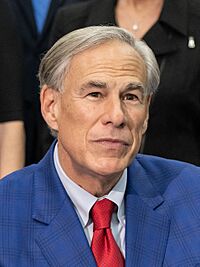Governor of Texas facts for kids
Quick facts for kids Governor of Texas |
|
|---|---|

Standard of the governor
|
|

Seal of the governor
|
|
|
|
| Style |
|
| Residence | Texas Governor's Mansion |
| Seat | Austin, Texas |
| Appointer | Popular vote |
| Term length | Four years, no term limit |
| Constituting instrument | Constitution of Texas |
| Precursor | President of the Republic of Texas |
| Formation | December 29, 1845 |
| First holder | James Pinckney Henderson (1846) |
| Succession | Line of succession |
| Deputy | Lieutenant Governor of Texas |
| Salary | $153,750 (2019) |
The Governor of Texas is like the top leader of the state of Texas. They are in charge of the executive branch of the government of Texas, which means they help carry out the state's laws. The Governor is also the commander-in-chief of the Texas Military Forces.
The Constitution of Texas explains what the Governor does. Their jobs include making sure state laws are followed. They can also approve or veto (reject) bills passed by the Texas Legislature. The Governor oversees many state agencies, issues special instructions called executive orders, and helps manage the state budget. They also choose people for important state jobs. The Governor can call special meetings of the legislature and, with advice from the Texas Board of Pardons and Paroles, can grant pardons (forgive someone for a crime).
Contents
Becoming Governor: Rules and Oath
Who Can Be Governor?
To become the Governor of Texas, a person must meet three main requirements. These rules are found in the state's constitution.
- They must be at least 30 years old.
- They must be a citizen of the United States.
- They must have lived in Texas for at least five years right before the election.
Taking the Oath of Office
Governors of Texas are chosen by voters in an election. They serve for four years, and there is no limit to how many terms they can serve. Before starting their job, the Governor must say a special promise called the oath of office. This promise is also in the Texas Constitution.
The oath says:
I, _______________________, do solemnly swear (or affirm), that I will faithfully execute the duties of the office of governor of the State of Texas, and will to the best of my ability preserve, protect, and defend the Constitution and laws of the United States and of this State, so help me God.
New Texas governors officially start their term on the third Tuesday of January after they are elected.
Removing a Governor from Office
How a Governor Can Be Removed
A Texas Governor can be removed from office if they are impeached. This means the State House of Representatives can accuse them of serious wrongdoing. These reasons include treason, bribery, or other major crimes.
If the House of Representatives votes to impeach the Governor, the case then goes to the State Senate for a trial. To remove the Governor from office, at least two-thirds of the Senate must vote for it. Unlike some other states, Texas does not allow voters to directly ask for a special election to remove the Governor.
History of the Governor's Role
Changes Over Time
The office of Governor was first created in Texas in 1845. Back then, a governor served for two years. They could serve no more than four years out of every six. This meant they could only have two terms in a row.
After the American Civil War, in 1866, the term length changed to four years. However, a governor could serve no more than eight years out of every twelve. In 1869, during the Reconstruction era, the limit on terms was removed completely. Today, Texas is one of 16 states or territories with no term limits for its governor. In 1876, the term went back to two years, but a change in 1972 made it four years again.
Elections and Longest-Serving Governors
Gubernatorial elections happen every four years. They take place on the Tuesday after the first Monday in November. These elections do not happen at the same time as the presidential elections. The Governor and the lieutenant governor are sworn into office together every four years.
Even without term limits, no Texas governor in the 1800s or 1900s served more than about seven and a half years in a row. Rick Perry, who was Governor from 2000 to 2015, broke these records. He became the first Texas Governor to serve three full four-year terms. Greg Abbott, the current Governor, was re-elected on November 8, 2022. He became the fifth Texas Governor to serve three terms. If the Governor's office becomes empty, the lieutenant governor becomes the new Governor. This rule was added in 1999.
Governor's Powers
Sharing Power in Texas
Texas has a system called a "plural executive government." This means that no single official is completely in charge of the Executive Branch. The Texas Governor has limited control over the state's budget. The Lieutenant Governor and the Speaker of the House manage the state's money.
Official Home and Workplace

The official home of the Texas Governor is the Texas Governor's Mansion. It is located in Austin. The mansion was built in 1854. It has been the home for every governor since 1856. It is also one of the places where the Governor works.
The Governor's main office is inside the Texas State Capitol building in Austin.
Timeline of Texas Governors
| Timeline of Texas governors |
 |
Who Takes Over if the Governor Can't Serve?
Line of Succession
If the Governor of Texas cannot do their job, another official takes over. This is called the line of succession. It is set by the Texas Constitution and state law. Here are the first few people in line:
- The Lieutenant Governor
- The President pro tempore of the Senate (a leader chosen by the Senate)
- The Speaker of the House of Representatives (the leader of the House)
- The Attorney General (the state's chief lawyer)
After these officials, the Chief Justices of the Texas Courts of Appeals would take over, in order from the 1st Court to the 14th Court.
See also
 In Spanish: Anexo:Gobernantes de Texas para niños
In Spanish: Anexo:Gobernantes de Texas para niños
- List of Texas governors and presidents
- List of presidents of the Republic of Texas
- Lieutenant Governor of Texas
- List of Texas state agencies
 | Frances Mary Albrier |
 | Whitney Young |
 | Muhammad Ali |


